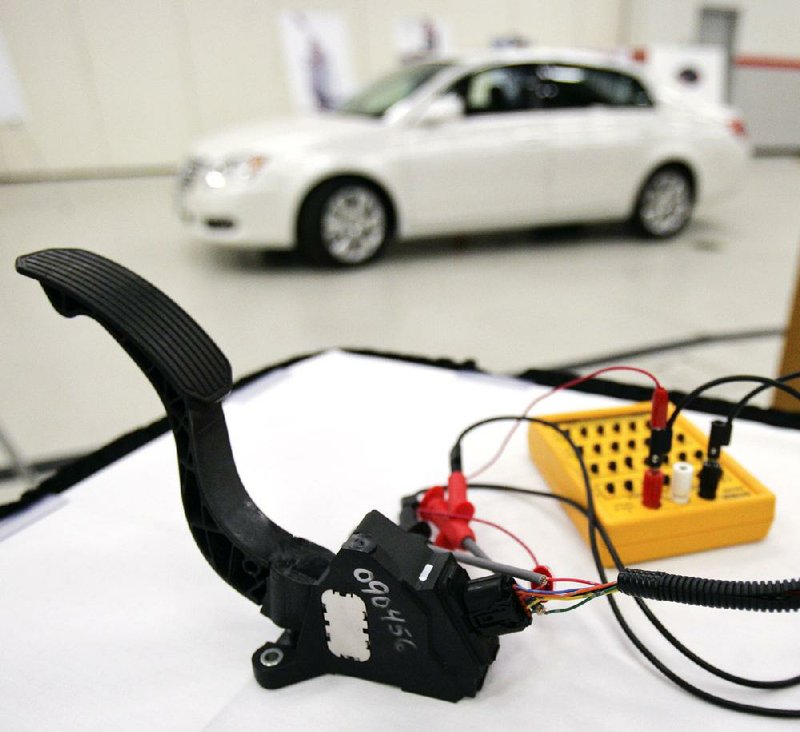LOS ANGELES — The nation’s top automobile safety regulator is ill-equipped to detect problems with high tech electronics that are increasingly commonplace in today’s cars, according to the conclusion of a government study released last week.
Calling such shortcomings “troubling,” the report called on the National Highway Traffic Safety Administration to review its technical capabilities and appoint an advisory panel to help it evaluate potentially serious risks associated with systems such as adaptive cruise control.
Despite those findings, the National Research Council found in a 162-page report that the National Highway Traffic Safety Administration’s decision to close its investigation of unintended, sudden acceleration in Toyota Motor Corp. vehicles was appropriate, and backed its conclusion that there was no evidence that an electronic defect caused the dangerous problem.
The proliferation of computerized devices poses new challenges for the National Highway Traffic Safety Administration, and “the agency needs to plan for the future of electronics in vehicles,” said Louis Lanzerotti, a physics professor at the New Jersey Institute of Technology and chairman of the committee that wrote the report.
When the traffic safety administration commissioned the study in March 2010, it was focused on evaluating “the broad topic of electronic vehicle controls and unintended acceleration as a whole.”
A number of accidents and several fatalities were blamed on unintended acceleration, but nothing conclusive about an electronic glitch was proved.
The final report dwells largely on the issues raised by Toyota’s problems, which led the automaker to issue more than 14 million recall notices worldwide.
But the recalls, for various models, involved low tech fixes - replacement of sticky accelerator pedals or floor mats that could cause the pedal to jam. Toyota denied that an electronic problem caused unintended acceleration.
The problems and recalls resulted in congressional hearings and Toyota being fined over fears stated by some people that unknown electronic bugs could pose a safety risk in modern vehicles.
Lanzerotti, however, said he knew of no fatalities caused by any electronic systems in any vehicle, a contention that safety advocates disputed.
According to the National Research Council, which is the operating arm of the National Academy of Sciences, the National Highway Traffic Safety Administration paid $1.3 million for the study, which came in seven months behind schedule.
“NHTSA has already taken steps to strengthen its expertise in electronic control systems,” the automobile safety agency said in a statement last week. “But NHTSA will continue to evaluate and improve every aspect of its work to keep the driving public safe.”
The National Research Council committee’s 16 members reviewed the agency’s investigations as well as a study by NASA on Toyota throttle systems. In addition, it met with consumer advocates, academics and automakers,including a full day spent with Toyota officials in Irvine, Calif., according to Lanzerotti.
Its report found that the traffic safety agency did not have the technical expertise to properly monitor safety in electronics that are rapidly taking control of nearly every automotive system. To deal with that, it recommended a number of steps, including the appointment of an outside technical advisory panel to help the agency keep abreast of technological advances. The findings mirrored conclusions made by the National Highway Traffic Safety Administration itself more than a year ago, when it found that it needed to “increase its existing expertise in vehicle electronics and emerging technologies.”
The contrast between the National Research Council’s two findings - that the agency properly concluded that Toyota’s electronics were not at fault in sudden acceleration and yet at the same time is lacking in technical expertise - struck some interested parties as glaring.
The National Research Council “implies that NHTSA is the Keystone Cops of investigating electronic throttles, but gives them a thumbs-up for their [unintended acceleration] investigation,” said Brian Strange, a Los Angeles attorney who is co-lead counsel in state lawsuits against Toyota claiming economic damages related to the acceleration problem.
Lanzerotti said his committee was not asked to perform any new research into the problem and simply reviewed existing materials related to unintended acceleration. He said the group did not review any individual driver complaints, nor did it check to see whether complaints continued to mount after the recalls were performed to correct sticking pedals and floor mats that could jam accelerators.
Toyota, which faces numerous state and federal lawsuits, welcomed the study.
“Toyota appreciates the NAS for its valuable work on vehicle electronics and the open process NAS has maintained throughout its investigation,” Toyota said in a statement, referring to the National Academy of Sciences, which oversees the National Research Council.
Business, Pages 21 on 01/23/2012
